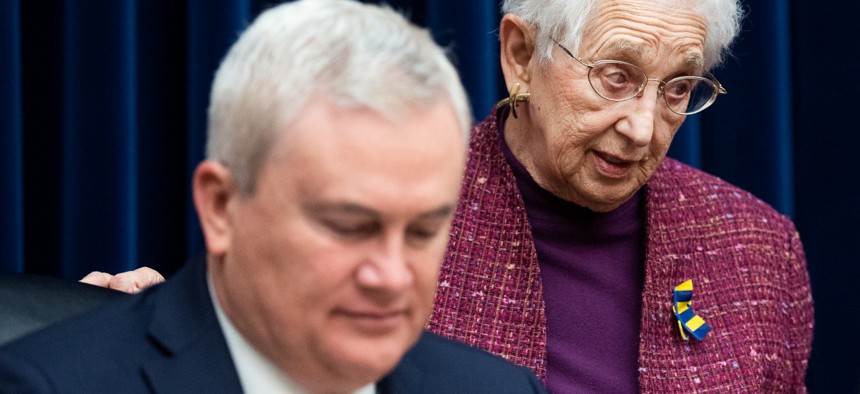
Reps. James Comer, R-Ky., and Virginia Foxx, R-N.C., expressed concern the use of maximum telework would "delay justice." Tom Williams/CQ-Roll Call, Inc via Getty Images
GOP Lawmakers Are Blaming a Union for the EEOC's Omicron Reentry Delay
Both the agency and its union said they’re committed to serving the public and ensuring the return to offices is done safely and according to federal labor law.
A pair of Republican lawmakers on Wednesday called for the Equal Employment Opportunity Commission to bring employees back to traditional work sites “immediately” and falsely blamed the agency’s union for the January decision to delay employees’ reentry.
In a letter to EEOC Chairwoman Charlotte Burrows, Reps. Virginia Foxx, R-N.C., and James Comer, R-Ky., said they worried that the continued use of a “maximum telework” posture by the agency could “delay justice” for people who have filed discrimination complaints against their employers, and put the blame at the feet of the American Federation of Government Employees, which represents EEOC workers.
“We are concerned EEOC does not have an immediately executable plan for returning its personnel to in-person work,” they wrote. “In January, a news report on EEOC’s plans suggested that the agency may have halted reopening efforts because of continued bargaining with the American Federation of Government Employees. Unfortunately, there still appears to be a disagreement between the commission and the AFGE.”
But EEOC’s January decision to delay reopening was not because of the union—it was because the COVID-19 omicron variant was surging through communities across the United States. In the course of announcing the delay, however, the agency committed to fulfilling its collective bargaining obligations before bringing employees back to the office, following criticism from union officials over a perceived lack of input on reentry prior to the delay.
In a statement to Government Executive, EEOC spokesman Victor Chen stressed that all of EEOC’s services that were available prior to the pandemic remain available virtually. Although the agency is still negotiating over the return of bargaining unit employees to physical offices, senior leaders will begin reporting to the office on Monday, with managers and supervisors coming back beginning April 4, and non-bargaining unit non-supervisors beginning their returns April 11. Chen said bargaining unit employees will receive 30 days’ notice prior to their own reentry date, in line with Biden administration guidance.
“While our physical offices are closed, all of our services have been available virtually, and we have continued to serve the public throughout the pandemic,” Chen said. “We encourage individuals who believe that they have been subjected to unlawful discrimination to visit www.eeoc.gov to find information on how to file a charge of discrimination. Individuals can also call 1-800-669-4000 for information on how they may pursue their rights.”
Chen also reiterated EEOC’s commitment to a constructive relationship with AFGE and said the agency will fulfill its bargaining obligations prior to bringing those employees back to work.
“The EEOC sees the union as an important partner in ensuring a successful reentry to EEOC’s physical offices and is committed to fulfilling all of its responsibilities with respect to collective bargaining,” he said.
And an AFGE spokesperson stressed that bargaining unit employees are committed to meeting EEOC’s mission in a way that protects the health and safety of both federal workers and members of the public.
“EEOC employees are always eager to meet the needs of the public, as they have done throughout the pandemic,” the spokesperson said. “The union is trying to negotiate a future workplace with an expanded hybrid of telework and in-person work, which would be the best way to recognize the amazing success of telework for the agency, the public and the workforce and allow employees to continue to deliver for the American people in a safe, healthy workplace, as well as with popular virtual service options.”







